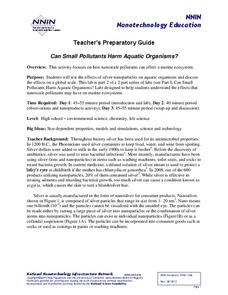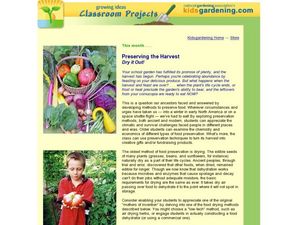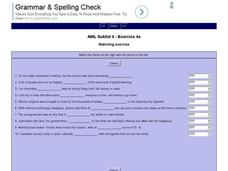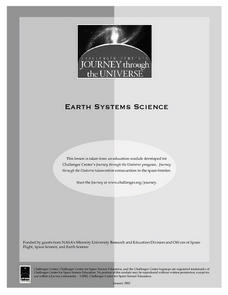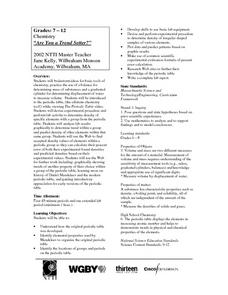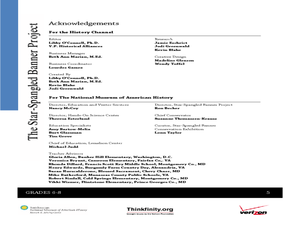Curated OER
Museum Practice for Students
Before any of us can learn to enjoy a trip to an art museum, we need to learn how to behave. This list of activities describe the behavior expected on a trip to an art museum. Each behavior comes with an activity intended to demonstrate...
Annenberg Foundation
Geometry 3D Shapes: Euler's Theorem
How do you get a theorem named after you? Euler knows what it takes! The third lesson of five asks pupils to use an interactive activity to compare the faces, vertices, and edges of seven different three-dimensional solids. They use...
Dearborn Public Schools
Parent Informational Meeting
What factors should parents and guardians consider when helping their children select high school courses each year? A presentation designed for Parent Information Night outlines the requirements students must meet in order to graduate.
American Museum of Natural History
Climate Change
It actually is possible to have too much of a good thing when it comes to climate change. A slide show lesson describes how burning fossil fuels contributes to climate change. Individuals read about the scientific process and the...
Howard Hughes Medical Institute
Winogradsky Columns: Microbial Ecology in the Classroom
Winogradsky columns are ideal for observing the role of bacteria and other microorganisms in an ecosystem. This student activity guide is complete with data tables for observations and analysis questions for processing what was observed....
Math Worksheets Land
Reading and Making Pie Graphs Worksheets
The opportunities are endless with a collection of five worksheets that enable young mathematicians to read pie graphs. Individuals use graphs to answer eight multiple choice questions on each sheet. The set of five allows for continued...
National Institute of Open Schooling
Atomic Structure
Learners explain historical findings such as Rutherford and Bohr's contributions, explain wave particle duality, and formulate Heinsenberg's uncertainty principle. They also draw s, p, and d orbitals, explain more historical findings,...
National Nanotechnology Infrastructure Network
Can Small Pollutants Harm Aquatic Organisms?
Nanoparticles have toxic effects on plant and animal life—even though you can't see them. The second lesson of a two-part series has young scientists conduct an experiment that exposes plant and animals to nanoparticle pollutants. They...
Kenan Fellows
Unit 1: Introduction to Biotechnology
Biotechnology is big! Introduce the uses of biotechnology to science scholars with a fascinating, fact-filled unit. The first installment in a series of four biotechnology units covers the role biotechnology plays in human and...
Newspaper Association of America
Cereal Bowl Science and Other Investigations with the Newspaper
What do cereal, fog, and space shuttles have to do with newspapers? A collection of science investigations encourage critical thinking using connections to the various parts of the newspaper. Activities range from building origami seed...
American Museum of Natural History
What do you Know About Climate Change?
Test the class's knowledge of the key components of climate change. A 10-question online quiz asks learners about weather, climate, greenhouse gases, and several other concepts related to climate change. Interactive and easy for...
Curated OER
Preserving the Harvest: Dry it Out!
Students explore how people preserved their food in the past. In food preservation instructional activity, students create different models that enable someone to dry out food, such as a food dehydrator. Students also learn how to...
Curated OER
English Vocabulary Skills: AWL Sublist 6 - Exercise 4a
In this online interactive English vocabulary skills worksheet, learners answer 10 matching questions which require them to fill in the blanks in 10 sentences. Students may submit their answers to be scored.
Curated OER
Space Shuttle
One slide details the features of Space Shuttle Discovery in graphic form. Another shows a faulty hydrogen fuel sensor. The final slide is a picture of the explosion of Space Shuttle Challenger and the ill-fated crew. If you wanted to...
Curated OER
Rust Never Sleeps
High schoolers investigate oxidation-reduction reactions involving iron by conducting an experiment in which they expose iron filings to different atmospheric and ocean conditions. They relate the results to the oxidation banding...
Curated OER
Make a Comet Model and Eat It!
Young scholars construct a comet model based on procedure provided. In this space science lesson, students compare the physical properties of comets to the models they made. They record their observations and share them with the class.
Curated OER
The Challenge to Deliver Insulin
Students study the types of diabetes and why insulin is important. For this diabetes lesson students build molecular models and create a healthy lifestyle plan.
Curated OER
Are You a Trend Setter?
Learners are introduced to the periodic table of elements. They devise and perform and experiment in which they determine the density of specific elements. They use their results to predict the density of other elements in the same group.
Curated OER
Acid Stomach
Students develop an understanding of how aspirin works and how understanding it's interaction with other chemicals in the body aided doctors in medical research. They complete a lab that compares the reaction of regular aspirin and...
Curated OER
Destructive Impact of Environment on Artifacts
Students recognize that artifacts are destroyed over time. In this environmental factors on artifacts lesson, students experiment and observe through the microscope to find the environmental impact on artifacts. Students make a list of...
Curated OER
Rockin? Chalk (Integrating science - make own chalk)
Students use plaster of Paris, talc, and cornstarch to create their own chalk. They hypothesize what mixture of ingredients produce the "best" chalk. Students discuss what they think are the characteristics of the "best" chalk.
Curated OER
Numbers in Art
Students choose a number from one to twelve and tell a number story about it. They listen to the teacher read "Numbers in Art" by Lucy Micklethwait. Students choose three numbers from one to twelve and view works of art while looking for...
Curated OER
Acid Neutralization Lab
Students discuss and design a lab to measure pH of limestone, pyrite, limestone-pyrite mixtures and their control. They have their labs approved by the instructor before they begin. Students preform the lab and explore the acid-base...
Curated OER
Cells: Structures and Processes
Students explore the basic unit of life, the cell in this nine lessons unit. The cell structure of animal and plant cell functions and how they affect our world are probed in this unit.
Other popular searches
- Brief History of Chemistry
- The History of Chemistry
- History of Chemistry Ppt
- History of Chemistry Pot
- Chemistry History









